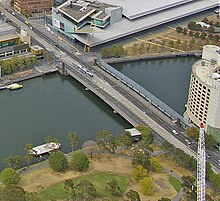Spencer Street Bridge
| Spencer Street Bridge | |
|---|---|
 |
|
| Coordinates | 37°49′23″S 144°57′21″E / 37.822942°S 144.955893°ECoordinates: 37°49′23″S 144°57′21″E / 37.822942°S 144.955893°E |
| Carries | Road, trams, pedestrians |
| Crosses | Yarra River |
| Locale | Melbourne, Australia |
| Characteristics | |
| Material | All steel superstructure |
| Total length | 405 ft (123 m) |
| Width | 80.6 ft (24.6 m) Roadway 12 ft (3.7 m) footways |
| Height | 28.5 ft (8.7 m) |
| Longest span | 130 ft (40 m) |
| No. of spans | 3 |
| Piers in water | Concrete on cylindrical caissons faced with bluestone down to rock |
| History | |
| Architect | Royal Victorian Institute of Architects Mr Oakley Mr Kermode Mr Perrin |
| Engineering design by | Mr W. D. Chapman |
| Constructed by | Railways Construction Branch |
| Construction start | 28 October 1927 |
| Construction end | 1930 |
| Construction cost | £168,700 |
The Spencer Street Bridge is a road and tram bridge over the Yarra River in Melbourne, Victoria, Australia. It connects Spencer Street on the north bank with Clarendon Street on the south.
During construction engineers knew deep foundations would be required to find bedrock, but at 20 metres below sea level they struck a red gum stump that took three weeks work to remove. It was dated at about 8,000 years old and appears to have lived for well over 400 years. The cantilever girder type, with steel girder suspended span bridge was completed in 1930, with an adjacent glass and steel covered footbridge built alongside in 1998, as part of the Melbourne Convention and Exhibition Centre.
The parallel glass and steel footbridge
Yarra River & Spencer Street Bridge
Spencer Street Bridge 1930 Plaque
...
Wikipedia
